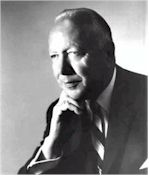Julius Adams Stratton
| Julius Adams Stratton | |
|---|---|
 |
|
| Born |
May 18, 1901 Seattle, Washington |
| Died | June 22, 1994 (aged 93) Boston, Massachusetts |
| Residence | United States |
| Nationality | American |
| Fields | Electrical engineering |
| Doctoral advisor | Paul Scherrer |
| Notable awards |
IEEE Medal of Honor (1957) Faraday Medal (1961) |
Julius Adams Stratton (May 18, 1901 – June 22, 1994) was a U.S. electrical engineer and university administrator. He attended the University of Washington for one year, where he was admitted to the Zeta Psi fraternity, then transferred to the Massachusetts Institute of Technology (MIT), from which he graduated with a bachelor's degree in 1923 and a master's degree in electrical engineering (EE) in 1926. He then followed graduate studies in Europe and the Technische Hochschule of Zürich (ETH Zurich), Switzerland, awarded him the degree of Doctor of Science in 1927.
He published the classic book "Electromagnetic Theory" as part of the McGraw-Hill series in Pure and Applied Physics in 1941. It has been re-issued by the IEEE.
He served as the president of MIT between 1959 and 1966, after serving the university in several lesser posts, notably appointments to provost in 1949, vice president in 1951, and chancellor in 1956. He also served as the chairman of the Ford Foundation between 1964 and 1971. In 1967, Stratton was seconded to chair a Congressionally established "Commission on Marine Sciences, Engineering and Resources" whose work culminated in a report, "Our Nation and the Sea", published in 1969, that had a major influence on ocean sciences and management in the United States and abroad. The commission itself became commonly referred to as the Stratton Commission.
Stratton was also a founding member of the National Academy of Engineering.
...
Wikipedia
